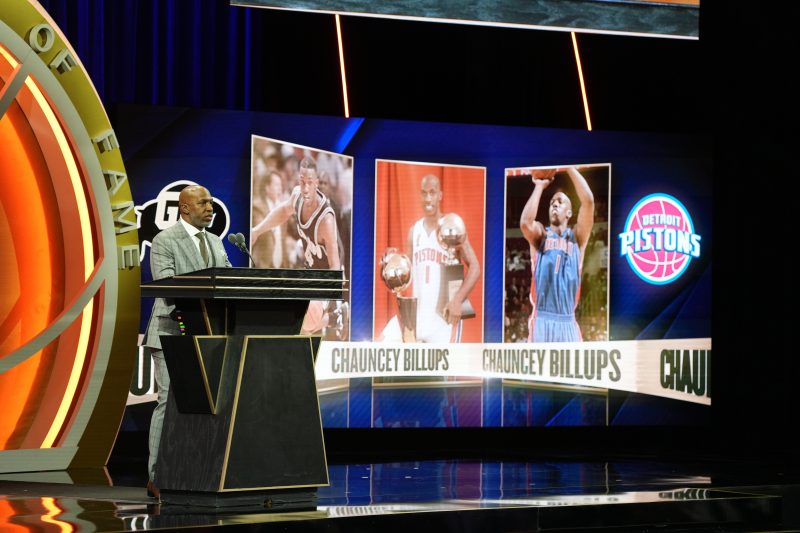
When Chauncey Billups left a federal courthouse in Portland on Thursday afternoon after being arrested hours earlier, the notion of an active NBA head coach being involved in what authorities said were underground and rigged poker games backed by the biggest names in organized crime, stunned the world.
Now, his future and legacy are in question until the day his case is resolved.
Until then, Billups is on leave from his job coaching the Portland Trail Blazers and is set to be arraigned in New York on Nov. 24 on charges of wire fraud conspiracy and money laundering conspiracy, each carrying a possible sentence of 20 years in prison.
The 49-year-old Billups, a five-time All-Star who spent 17 seasons in the NBA and won a Finals MVP award with the Detroit Pistons in 2004, was inducted into the Naismith Memoral Basketball Hall of Fame in 2024.
In another part of the indictment tied to gambling, Billups is believed to be ‘Co-Conspirator 8,’ who authorities say gave confidential game information before it was publicly available, and is described as an ex-NBA player who played from 1997 to 2014, an NBA coach since 2021, and an Oregon resident. Billups meets all three of those characteristics.
The highest honor for an athlete is enshrinement in their sport’s Hall of Fame, and for Billups, his induction is secure for now, as the bylaws contain no provision for removing an enshrinee for any reason.
The Naismith Hall of Fame does make sure that they remove candidates who have ‘damaged the integrity of the game of basketball,’ but that is before a player is voted in for induction.
Billups’ attorney Chris Heywood says that his client ‘has never and would never gamble on basketball games, provide insider information, or sacrifice the trust of his team and the League, as it would tarnish the game he has devoted his entire life to.’
Here is how other North American Sports Hall of Fames handle those who run afoul of the law after they are inducted:
NFL
While the Basketball Hall of Fame implies that no member can be removed, the Pro Football Hall of Fame bylaws explicitly state that no person may be removed, no matter what they have done after enshrinement. The issue was raised recently when a statue of former Washington owner George Preston Marshall was removed from RFK Stadium. Marshall was a known racist and segregationist who refused to integrate his team until being forced to in 1962.
The most famous example of a Hall of Fame player whose induction was scrutinized after the fact was O.J. Simpson. Simpson was acquitted of the double murder of his ex-wife, Nicole Brown Simpson, and her friend, Ronald Goldman, in 1994, but was later convicted of armed robbery and kidnapping and sentenced to 33 years in prison. He served nine years before being paroled in 2017.
MLB
Over the years, baseball has made sure to keep out Hall of Fame players it believes have ruined the integrity of the game. While no player has ever been removed, they have kept cheaters, gamblers, and others who have committed various forms of malfeasance at arm’s length for decades.
But in 2025, Commissioner Rob Manfred removed Pete Rose, ‘Shoeless’ Joe Jackson, and 15 others from the permanently ineligible list, making them immediately eligible for the Hall. Manfred said there is no reason to keep them on the list once they have died.
Death may be the only way retired players such as Alex Rodriguez, Barry Bonds, Roger Clemens, Rafael Palmeiro, Sammy Sosa, and many others who have been accused of using performance-enhancing substances will ever be given the honor to grace the walls in Cooperstown, New York.
NHL
The National Hockey League also has never removed a member, but the Hall’s board has set a precedent and can vote to remove an inductee.
In 1998, Alan Eagleson, who had once been the executive director of the Players’ Association, resigned after 18 Hockey Hall of Fame members, including Gordie Howe, Bobby Orr, Ted Lindsay, and Bobby Hull, said they would leave the Hall if Eagleson were allowed to remain.
Eagleson, elected to the Hall in 1989, pleaded guilty to three counts of mail fraud after being accused of defrauding the league’s players by skimming players’ pension funds and disability payments and was fined $700,000. Eagleson pleaded guilty to an additional three counts in Canada and was sentenced to 18 months in prison. He resigned from the Hall less than a week before the Board’s directors were to vote on his possible expulsion.
Tennis
One sport’s Hall of Fame has taken the steps of removing a person after induction.
In 2012, the International Tennis Hall of Fame expelled former Grand Slam doubles champion Bob Hewitt, who was accused of sexually assaulting minors he was coaching. Hewitt was convicted in 2015 and was released from prison after serving four years of a six-year sentence.
